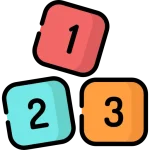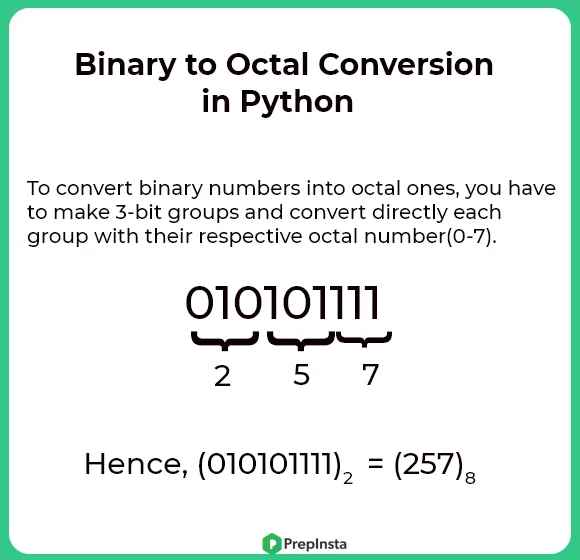Python program for binary to octal conversion
Binary to Octal Conversion in Python
Here, in this section we will discuss the binary to octal conversion in Python.Binary numbers are also known as bits that represent 0 means FALSE and 1 means TRUE, but usually binary numbers are with base 2 and can represent any number in form of 0 and 1. Whereas Octal numbers expressed with base 8 and can represent any number with 0 to 7.

Method discussed
We will first convert the Binary number into Decimal and then convert the Decimal number into Octal
Make sure that you have gone through these approaches below –
Method 1 Code
# function to convert binary to octal
def convert(num):
octalDigit = 0
count = 1
i = 0
pos = 0
octalArray = [0] * 32
while num != 0:
digit = num % 10
octalDigit += digit * pow(2, i)
i += 1
num //= 10
# placing current octal-sum for 3 pair in array index position
octalArray[pos] = octalDigit
# whenever we have read next 3 digits
# setting values to default
# increasing pos so next values can be placed at next array index
if count % 3 == 0:
octalDigit = 0
i = 0
pos += 1
count += 1
# printing octal array in reverse order
for j in range(pos, -1, -1):
print(octalArray[j], end='')
binary = 1010
convert(binary)
Output :
Enter binary number: 1010
Decimal : 10
Octal : 12
Method 2:-
Method 2 uses the concept of grouping 3 successive digits/bits of the binary number and calculating octal digits against each grouping
We use an additional array to store the octal digits at each index.
We will need to print the array in reverse to get actual octal equivalent.

Method 2 Code
# function to convert binary to octal
def convert(num):
octalDigit = 0
count = 1
i = 0
pos = 0
octalArray = [0] * 32
while num != 0:
digit = num % 10
octalDigit += digit * pow(2, i)
i += 1
num //= 10
# placing current octal-sum for 3 pair in array index position
octalArray[pos] = octalDigit
# whenever we have read next 3 digits
# setting values to default
# increasing pos so next values can be placed at next array index
if count % 3 == 0:
octalDigit = 0
i = 0
pos += 1
count += 1
# printing octal array in reverse order
for j in range(pos, -1, -1):
print(octalArray[j], end='')
binary = 10101111
convert(binary)
Output :
Enter binary number: 10101111
257
Prime Course Trailer
Related Banners
Get PrepInsta Prime & get Access to all 200+ courses offered by PrepInsta in One Subscription






#binary to decimal conversion
n=int(input())
s=0
base=0
for i in str(n)[::-1]:
s+=(int(i)*(2**base))
base+=1
n=int(n/10)
print(“decimal number:”,s)
#decimal to octal conversion
a=[]
while(s>0):
r=s%8
a.append(r)
s=int(s/8)
for i in a[::-1]:
print(i,end=”)
EASY WAY:
biNum = int(input(“Enter a Binary Number: “))
print(oct(int(biNum, 2))[2:])
biNum = (input(“Enter a Binary Number: “))
print(oct(int(biNum, 2))[2:])
print(“Enter a binary number: “)
binary = int(input())
octal = 0
decimal = 0
i = 0
while (binary != 0):
decimal = decimal + (binary % 10) * pow(2, i)
i += 1
binary = binary // 10
print(“decimal value “, decimal)
i = 1
while (decimal != 0):
octal = octal + (decimal % 8) * i
decimal = decimal // 8
i = i * 10
print(“octal value: “, octal)
num=int(input(“Enter the binary number “))
sum=0
temp=num
base=1
while(temp):
digit=temp%10
sum+=digit*base
base*=8
temp//=10
print(“The octal value of {} is {}”.format(num,sum))
n=int(input(“Enter a binary NO:”))
binary_no=n
decimal=0
b=1
while n!=0:
r=n%10
decimal=decimal+r*b
n=n//10
b=b*2
octal=0
i=1
while decimal!=0:
octal=octal+(decimal%8)*i
decimal=decimal//8
i=i*10
print(octal)